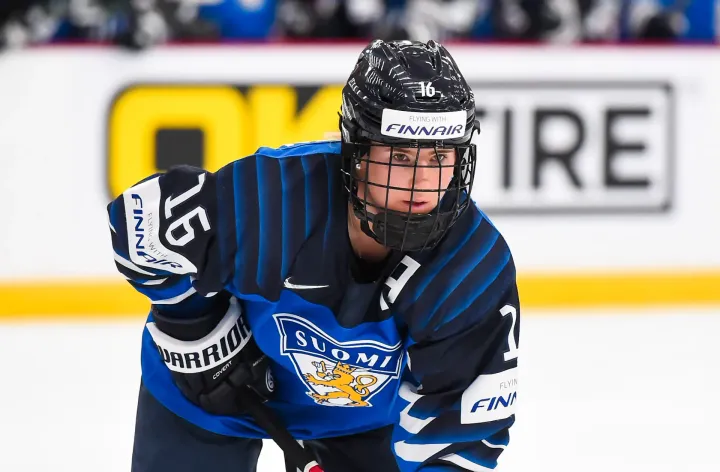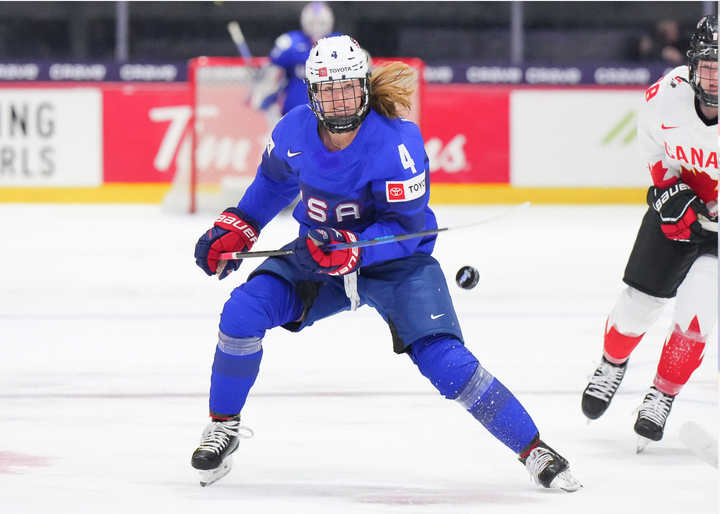Women’s Hockey Top 25 Under 25 | Number 11 - Halli Krzyzaniak
Just 23 by the time of the Games, the second-youngest defender in Canadian World Championship history will be among the most experienced youngsters in PyeongChang.
Halli Krzyzaniak was already a three-time World Championship veteran by the time she graduated university this spring, which says a lot about a defender coming up through the Canadian program. The 22-year-old is the second-youngest defender centralized by Canada for the 2018 Olympic team, the fifth-youngest centralized player overall, and equal with forward Emily Clark as the most experienced of the country's under-25s.
Krzyzaniak excels at the defensive aspects of the game, reading plays well and cutting down angles to contain the opposition. Because of this, her greatest contributions aren’t measured on the scoresheet. In the rare cases where she’s had to be flashy, things have usually gone well:
U.S. 2-on-1, nicely timed block by Canadian D Halli Krzyzaniak. It's taking much practice to spell that name.#WomensWorlds
— Donna Spencer (@DLSpencer10) April 5, 2016
In three World Championship tournaments, Krzyzaniak has won three silver medals, scoring two goals and four points with a net plus-3 rating in 15 games.
Ice time isn’t tracked at the Women’s World Championship, but it seems safe to say that Krzyzaniak played more minutes against tougher opposition than either of Canada’s other two under-25 defenders at Worlds — not just in 2017, but also in both of her two prior tournaments. She had a significant role in all three Worlds despite always being the youngest defender on the roster.
In her final NCAA season, Krzyzaniak posted five goals and 18 points in 36 games, producing 10.6 more points than the average of other North Dakota defenders. UND coach Brian Idalski estimated that she played upwards of 28 minutes per game. Krzyzaniak also finished fourth among Western College Hockey Association (WCHA) defenders in regular-season assists and was named a second team WCHA all-star in a very deep conference.
Past accomplishments
Krzyzaniak made her senior World Championship debut in Malmӧ, Sweden, on March 28, 2015, at the age of 20 years, one month, and 24 days, making her the second-youngest defender to ever play for Canada at a Worlds or Olympic Games. She played primarily on the second pairing throughout that tournament, alongside Courtney Birchard, and finished with one assist and a plus-3 rating. Canada won silver, as they have in each of the two editions since.
Defensive duos have been less than stable under Laura Schuler. Krzyzaniak played with four different partners in five games at 2016 Worlds, alternating between the first and third pairings. She scored two goals, both against Russia, with one on the power play, and wrapped up the tournament with a plus-2 rating.
.@Krzyznasty18 scores from the point on a shot that fools the Russian goalie #WomensWorlds pic.twitter.com/FOjy6yuTNe
— Women's Hockey Gifs (@CWHLHighlights) March 30, 2016
On paper, the 2017 World Championship was her worst showing of the bunch, but that tournament was also marked by what could be described as a series of small disasters for Team Canada.
Krzyzaniak finished with one assist and a minus-2 rating, which largely highlights the limitations of the plus/minus statistic — unfortunately one of the only metrics to work with in women’s hockey. She appeared to struggle at times on the top pairing in the opening 2-0 loss to the Americans, though she wasn’t on the ice for either of the U.S. goals. That a 22-year-old began the tournament on the top pairing speaks volumes about Krzyzaniak's skill level, and if she sometimes looked slightly out of her depth against the very best of the defending world champions, that can hardly be held against her.
Krzyzaniak also has one gold (2014) and one silver (2015) medal from the Four Nations Cup and won silver at the 2017 Nations Cup.
She earned third-team all-WCHA honours in 2015 and 2016.
At the youth level, Krzyzaniak’s resume is enviable. She won gold medals with Team Canada at the 2012 and 2013 U18 Women’s World Championships, and was named Top Defenceman by the IIHF directorate at the 2013 tournament. Within Canada, she was named Top Defenceman and Most Valuable Player — the only player to ever win both — en route to winning silver with Manitoba at 2012 U18 Nationals, and won bronze with Manitoba in 2011. She was named Top Defenceman in the Canadian Sport School Hockey League (CSSHL) in 2012, and won the CSSHL championship with Pursuit of Excellence in 2011.
Future impact
Team Canada supporters will be looking for Schuler to put the line scrambler to rest in the coming months and develop some semblance of stability leading into the Olympics. Krzyzaniak would likely fit best on the second pairing alongside an established left-handed defender such as Laura Fortino or Lauriane Rougeau, with the potential to play first-pairing minutes. Though she’ll have just turned 23 at the time of the Games, Krzyzaniak will be relied upon as one of Canada’s most experienced defenders.
Moving forward past 2018, expect Krzyzaniak to be a mainstay on the Canadian blue line. She’s poised to develop into the country’s top shut-down defender and be a staple of the national team for years to come.
Is this ranking too high or too low?
How Krzyzaniak fell to 11 is, frankly, beyond me. There’s a clear case to put her in the top five — that’s where both of the Canadians polled had her — and her ranking outside the top 10 doesn’t reflect her performances. As a solid, reliable defender, Krzyzaniak isn’t usually the flashiest of players, and this sign of a job well done may be what kept her off some voters’ radars. A deeper look into her role with the national team places her as Canada’s best up-and-coming defender, and that the poll doesn’t reflect this probably says more about the limited data available to evaluate defenders in women’s hockey than about the athlete. More points and a positive plus/minus rating might help her statistical case to rank higher in future polls, but if that’s what we’re using to evaluate defenders, we’re not doing a very good job.
Highest rank: No. 4
Lowest rank: Not ranked.





Comments ()